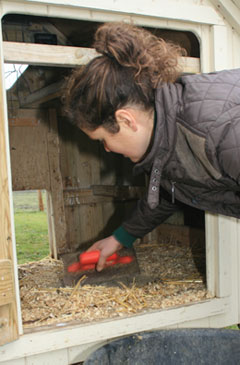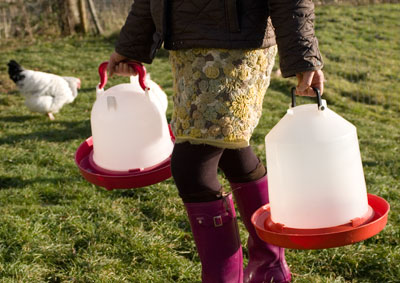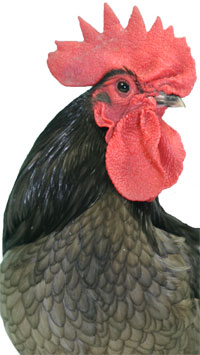Stress is a major contributor to ill health in chickens and can also make them more prone to a number of vices such as feather picking, egg eating, comb or vent pecking.
Chickens kept in intensive conditions are constantly subjected to stress which is why farmers see such high mortality rates and have to pay out to keep birds healthy and make them productive. Fortunately, keeping chickens in our back garden isn’t exactly intensive as long as they have a sufficiently large run or are let out of their run regularly to free-range although there are pleanty of other times when chickens can suffer from stress.
In short, stress is best avoided whenever possible and a little bit of care and forethought can dramatically reduce stress in your birds.
So how do we know what stresses chickens? Well, some years ago, there were studies done that measured the stress hormone ‘corticosterone’ of birds in different situations and it is this research that has enabled us to understand the stressors.
Stressors.
As well as intensive conditions causing stress, the other main stressors can seem quite trivial to us.
- Handling. This is one of the biggest stressors. Chickens are a prey species so naturally, if caught and picked up, they become stressed. Whilst regular handling is important for health checks, chasing a bird around a run for 5 minutes every time will not help. Try to catch birds in a confined area such as a house quickly and calmly. Hold the wings firmly and then transfer the bird to the holding position with your right hand underneath her, breast in the palm of your hand, fingers holding the tops of the legs. Her head should be underneath your arm so her head is looking behind you. Use your left hand to examine her.
- Introducing new chickens. Chickens are flock animals that have a pecking order. It is thought the ancestors to our chickens, the Red Jungle Fowl of South East Asia use the pecking order to assist in their survival. If every bird has her place, when it comes to feeding time, each one can have her turn and they don’t have to spend precious time arguing which may alert predators to their where-abouts. Every hen knows her place in the pecking order and by introducing new birds, the pecking order is upset. No hen knows where she stands and this will cause arguments and considerable stress for days until they have sorted themselves out into a ‘new flock’.
- Lack of food or water. This stress is completely avoidable of course but we all have those one off days when we suddenly realise that our birds have run out of water for one reason or another. A leaky water container, frozen water or just a forgetful moment!
- Extreme heat. Chickens don’t sweat. To cool down, a chicken must either take on cool water (and excrete more to lose the excess fluids and some heat) or pant which removes heat through the air they exhale. Chickens are much better equipped to deal with the cold and can keep their body temperature up by eating more and trapping air inside their feathers to insulate themselves thermally. Heat will cause chickens to become stressed.
- A new environment. This can be taking a bird to a show, getting your birds for the first time or just moving them to a different house or run. Another environmental change that is hard to avoid but causes considerable stress for your birds is when there has been a covering of snow.
- Egg laying. This is surprising since this is a natural things that chickens do but egg laying does cause stress on your hens. Giving them a peaceful, private, darkened nest box can help. Try not to disturb hens that are in the process of laying.
- Predation. Foxes or other predators visiting the garden on a regular basis are likely to cause stress. In the extreme case, after a fox attack, even though a chicken may survive the wounds inflicted by a fox (he grabs a mouth full of her feathers for example and the chicken escapes), she can still die because of the stress.

If you can minimise stress, your birds will be less prone to picking up disease which is something we would all like: happy, healthy chickens!






Hi i have 10 chickens in my flock and one cockerel, recently one of my hens started coughing or sneezing looks like both i suppose, then my little hen has started doing the same so there’s now two of them, what could this be?
Also the little one keeps hiding away under the pallets or where ever she finds a place away from the rest of the hens, soon as she comes out the rooster is on her every time, he just wont leave her alone i think this is why she hides away and doesnt come out, how do i fix this problem because i want her to feel comfortable with all of them and free range, every time i look at her she seems scared and worried and it makes me feel horrible and upset, please help.
Thanks
It sounds like it could be either an upper respiratory infection – often brought on as a secondary infection by some underlying disease. Micoplasma Galisepticum is the normal one that is very common. Another possibility is gape worm which can also cause ‘snicking’ and stretching of the neck but this is rare and shouldn’t be a problem if they are wormed regularly.
With the hen that’s hiding, she needs to have a break from the cock. Check his spurs aren’t too big / sharp (they can be trimmed with care, see the poultrykeeper.com website for info on how to do this) and check her sides for wounds (spurs can tear the skin and she could be in pain).
Cocks are useful but can be a pain, especially if they have favourites that are getting too much attention. In the long run, if you can, give them a bigger run and give him a few more hens this may help, if not it’s a new cock or getting rid of him all together or at least only allowing him in with the hens for a day or two each week.
Hi I have 4 white 2 grey 2 red and recently introduced 2 black and white speckled hens to the pack , there was a bit of pecking at food time but nothing major, we were getting 9 eggs a day including 4 whites, over the last week or so the whites have more or less disapeared but we have noticed 1 of the black hens wont leave the the place were they all lay ( a small dog box) and the eggs are missing , even when we move her out she cant get back in quick enough , the eggs that were in the box over the weekend I beleive are no use as she was lying on them for days, they have a really big shed and a big coup and a few high perches we made inside the shed to sleep in , but only a red and a and a white goes into the couup the rest sleep on the perchs and even on top of coup there is a small flap for them to go out into and enclosed area 30 feet by 6 but we normally open the door and let them roam free all day which they seem to love, do you think they are laying somewhere else as the black 1 is staying in the box so long ?
I think there are probably 2 things going on here – the hen is broody and trying to sit on eggs. This should be discouraged at this time of year (search for “how to stop a broody hen” poultrykeeper.com has some good advice) and also I assume you are in the Northern Hemisphere / UK – so the daylight hours are reducing and chickens will stop laying for the winter because of the lack of light. (again poultrykeeper has an article called “Why have my chickens stopped laying”.
Hi, I added two new hens to my flock of four, there was a little bit of squabbling at first but they have sorted the hierarchy out now. One of my new girls, she’s a light Sussex started laying about a month ago, but stopped two weeks after that and we have had no more eggs from her. The last couple of day she’s been very withdrawn, lethargic and not eating but drinking a lot, she has also has diarrhoea but has very good comb colour. She’s not egg bound and there’s no mites. Any ideas what this could be, I’ve kept chickens for 7 years and I’m clueless?
If she is wormed, I would take her to the vet. She will probably need antibiotics to clear the problem up.
My. Chooks are 2.5 years old and have gradually stopped laying this year. I’ve tried worming and cleaning coop etc but to no avail. I had to have one of my birds put to sleep in the summer since she seemed to have a blockage and appeared unwell. She hadn’t laid since December . I’m not sure what is going on. One of them is passing runny poo and the coop smells of urine. Have you any advice ?
Well, I would wait until the spring – they won’t be laying now because the day length is too short.
What can be done about two roosters who seem to favor two out of ten chickens and the chickens feathers are being pulled out and looks bad?
They are over-mating because of the competition. 10 hens would be better with only 1 rooster.
There are also poultry saddles available that can be put onto the two hens backs and secured around their wings so they have some protection but I would also trim the rooster’s spurs and round them off to help.